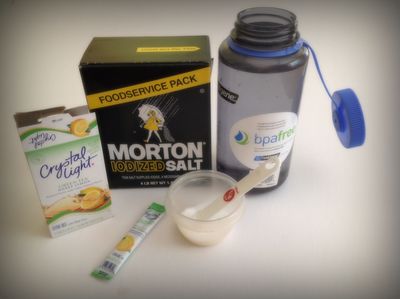DIY Electrolyte Drink
Sometimes rehydration is more important than fueling, especially in the summer. If you want a low calorie electrolyte you can buy Nuun tablets or similar options, these are a little pricy and don't contain enough sodium. Electrolyte Capsules should be a last resort, as they have a number of problems. A better and cheaper option is to make your own electrolyte drink. I've used this recipe successfully at the Keys 100 and Badwater. The recipe is based on The Science Of Hydration and Practical Hydration advice.
1 Ingredients
| Ingredient | Quantity | Notes | |
|---|---|---|---|
| Water | Required | 32oz/1Litre | |
| Salt (regular table salt) | Required | 1/4 to 1/2 teaspoon (1.5 to 3.0g) | Provides 500-1,000mg Sodium |
| Sugar free singles | Optional & recommended | 1 packet intended for 16oz/500ml | Improving the taste increases fluid intake.
Diluting with twice the water works because the salt increases the flavor |
| No Salt (Potassium Chloride) | Conditionally required & recommended | 1/8 to 1/4 teaspoon (0.6 to 1.3g) | Under most circumstances a normal diet will provide plenty of potassium, but under extreme situations (running an ultra in hot weather), some extra potassium can be valuable. |
| Choline Citrate | Optional and not in all fluids | 1/4 teaspoon | There is some evidence that choline becomes depleted in the brain during exercise. |
| Taurine | Optional and not in all fluids | 1/4 teaspoon | There's a possibility that adding some Taurine might help performance. |
I limit my intake of Choline and Taurine to a few of my drinks on a given run. For instance, at Badwater I only had Choline and Taurine every 10 miles or so.
2 Relationship to Go Juice
You can add more salt to this drink than you can to Fellrnr's Go Juice as the extra ingredients in the Go Juice compete for absorption (more precisely they increase the osmotic pressure). Also, Fellrnr's Go Juice contains a lot of calories, sometimes more than you want if you're just trying to rehydrate.
3 See Also
If you want to know more about hydration and why the extra salt is required, read Practical Hydration and for the underlying science read The Science Of Hydration.
